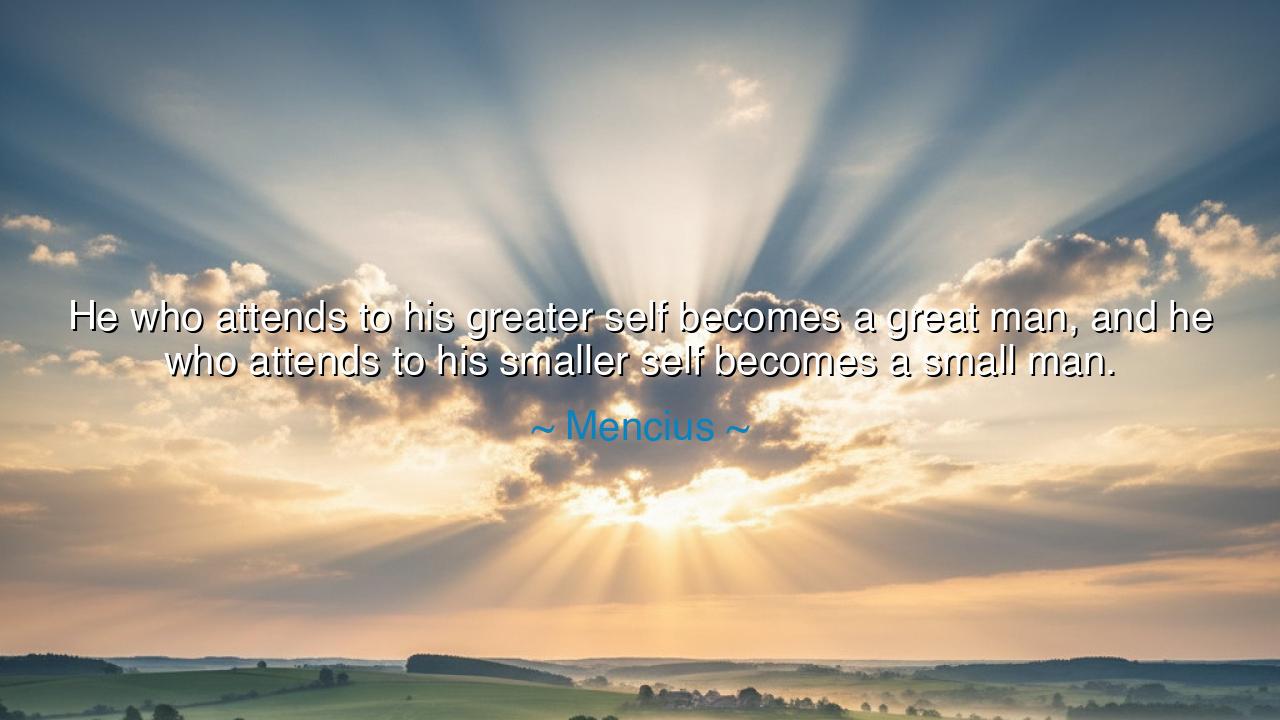
He who attends to his greater self becomes a great man, and he
He who attends to his greater self becomes a great man, and he who attends to his smaller self becomes a small man.






“He who attends to his greater self becomes a great man, and he who attends to his smaller self becomes a small man.” Thus spoke Mencius, the sage who followed in the footsteps of Confucius, breathing life into the ancient spirit of virtue and humanity. In these words lies a timeless law of the soul — that the stature of a man is not measured by his birth or possessions, but by the self he chooses to serve. Every heart, said Mencius, contains two selves: the greater self, which seeks righteousness and truth, and the smaller self, which clings to comfort and gain. To live by the greater self is to walk the path of the noble; to live by the smaller self is to dwell in the shadows of mediocrity.
In the age of Mencius, the kingdoms of China were torn by ambition and war. Rulers fought for land, not for virtue; ministers sought favor, not justice. Amid such turmoil, Mencius journeyed from court to court, preaching that the strength of a nation begins in the heart of man. He taught that within each person burns a divine spark, a moral compass he called the “heart of benevolence.” Yet this light can be dimmed by greed, fear, and vanity — the whispers of the smaller self. The greater self, by contrast, listens to the call of Heaven, striving for harmony, compassion, and truth even when the world turns away. His quote was a plea to awaken that inner nobility and to build civilization upon the foundation of moral greatness, not mere power.
To attend to one’s greater self is to live with purpose beyond the self. It means to act not for applause, but for justice; not for profit, but for rightness. Such a man may suffer loss in the eyes of the world, but he gains the quiet strength of the spirit. The small man, meanwhile, chases comfort and advantage, serving his body while starving his soul. He is ruled by appetite, anger, and envy — the fleeting shadows of desire. He may climb in rank, but he never rises in worth. Mencius saw that the ruin of kings, families, and nations begins when men forget the difference between the greater and smaller self, when they exchange virtue for vanity and principle for profit.
Consider the story of King Wen of Zhou, revered by Mencius as the model of a virtuous ruler. When famine struck his land, he opened his own granaries to feed the poor, though his advisors warned him it would weaken the treasury. “If the people perish,” he said, “what use is a full storehouse to me?” By attending to his greater self, he not only saved his people but laid the foundation for a dynasty remembered for centuries. His reign proved that true greatness lies not in dominion, but in benevolence, and that the heart that serves others becomes vast as the heavens themselves.
In contrast, the chronicles speak also of King Zhou of Shang, a ruler consumed by lust and arrogance. He built palaces of gold and drank from cups of jade while his people starved in the fields. He attended only to his smaller self, feeding his pride until it devoured his reason. In the end, his empire fell in flames, and his name became a curse upon the lips of generations. Thus, the ancients saw that greatness and smallness are not matters of power, but of the soul’s allegiance — to Heaven or to hunger, to virtue or to vanity.
The wisdom of Mencius endures because it speaks to every age. Even now, in a world of abundance and ambition, men and women stand daily at this same crossroads. The greater self calls us to courage, truth, and compassion; the smaller self tempts us with comfort, greed, and fear. To attend to the greater self is to cultivate character — to practice humility, to speak honestly, to act justly even when unseen. To attend to the smaller self is to drift through life as a servant of impulse, forever chasing satisfaction that never lasts.
Therefore, O seeker of wisdom, remember this: the greatness of your life will be measured not by what you gain, but by what you give; not by how loudly you live, but by how faithfully you serve the good within you. Attend each day to your greater self — through reflection, through discipline, through acts of kindness. Resist the whispers of the lesser desires that promise pleasure but deliver emptiness. For as Mencius taught, the destiny of a person — and indeed, of all humanity — is shaped not by chance, but by which self we choose to nourish.
Let this, then, be your guide: the greater self seeks truth and brings peace; the smaller self seeks pleasure and brings ruin. Feed the flame of the greater self until it burns bright enough to guide others. Live not as one who is small in heart though large in wealth, but as one who is vast in spirit though humble in circumstance. For he who attends to his greater self walks the path of the sages, and though time may fade his name, his light will shine forever in the hearts of those who follow.






AAdministratorAdministrator
Welcome, honored guests. Please leave a comment, we will respond soon